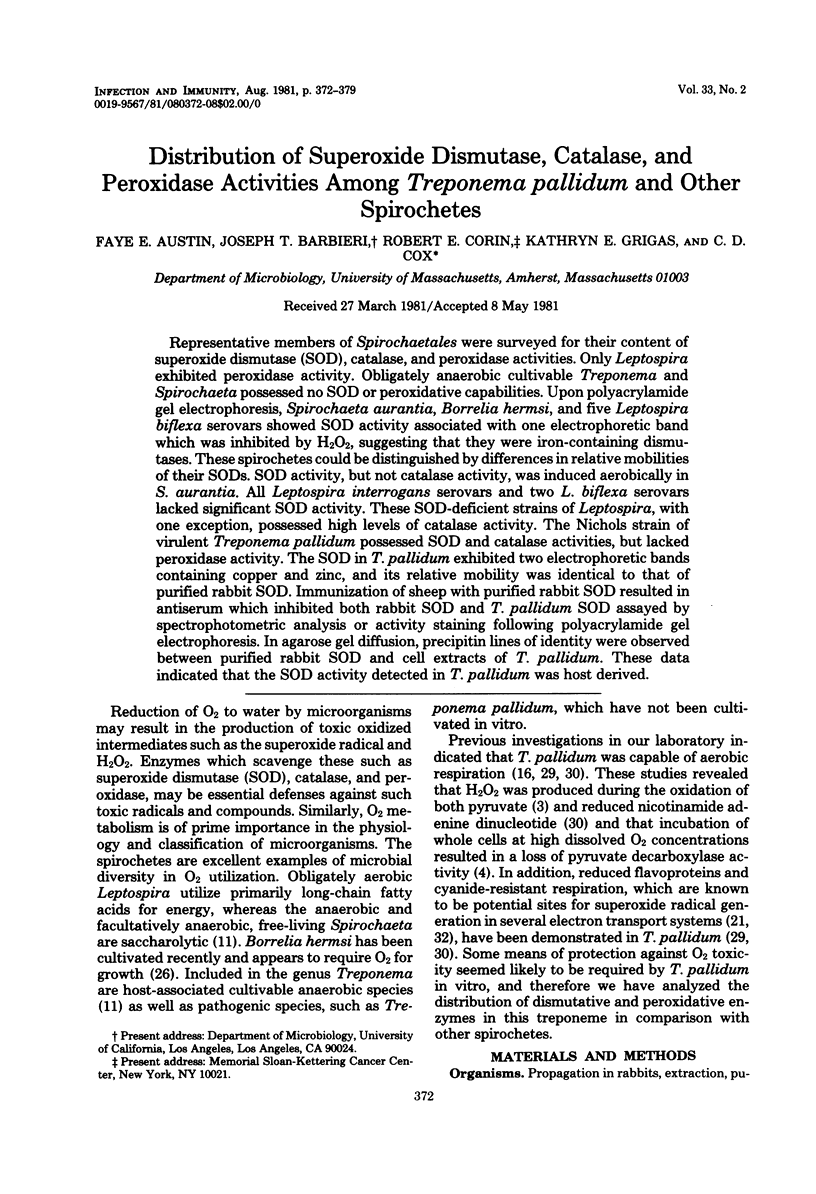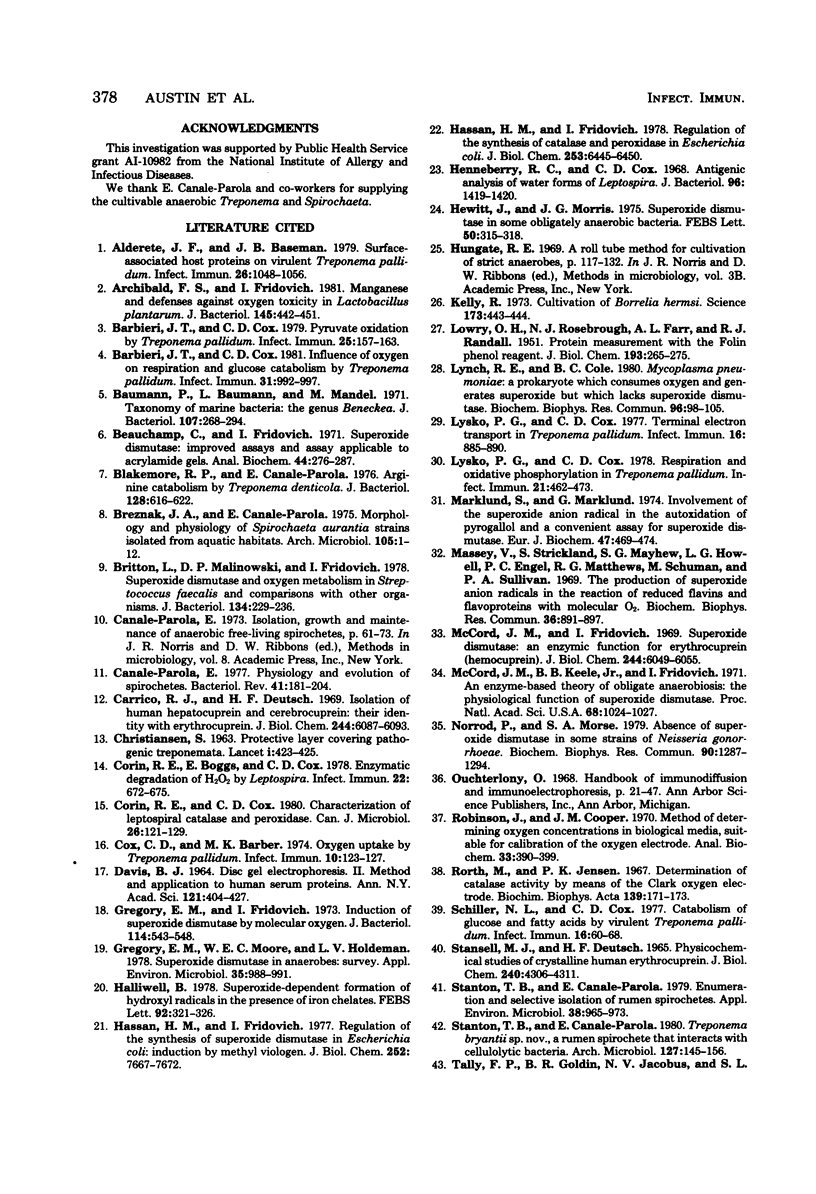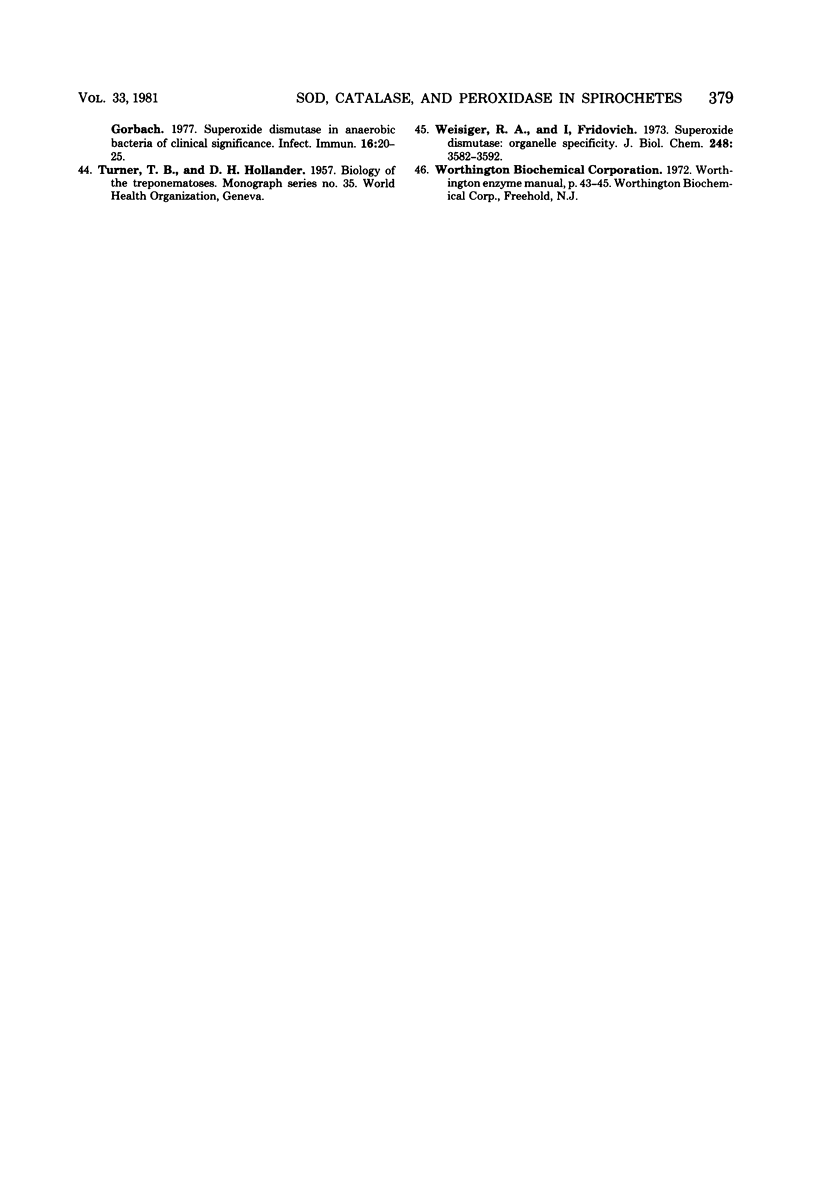Abstract
Representative members of Spirochaetales were surveyed for their content of superoxide dismutase (SOD), catalase, and peroxidase activities. Only Leptospira exhibited peroxidase activity. Obligately anaerobic cultivable Treponema and Spirochaeta possessed no SOD or peroxidative capabilities. Upon polyacrylamide gel electrophoresis, Spirochaeta aurantia, Borrelia hermsi, and five Leptospira biflexa serovars showed SOD activity associated with one electrophoretic band which was inhibited by H2O2, suggesting that they were iron-containing dismutases. These spirochetes could be distinguished by differences in relative mobilities of their SODs. SOD activity, but not catalase activity, was induced aerobically in S. aurantia. All Leptospira interrogans serovars and two L. biflexa serovars lacked significant SOD activity. These SOD-deficient strains of Leptospira, with one exception, possessed high levels of catalase activity. The Nichols strain of virulent Treponema pallidum possessed SOD and catalase activities, but lacked peroxidase activity. The SOD in T. pallidum exhibited two electrophoretic bands containing copper and zinc, and its relative mobility was identical to that of purified rabbit SOD. Immunization of sheep with purified rabbit SOD resulted in antiserum which inhibited both rabbit SOD and T. pallidum SOD assayed by spectrophotometric analysis or activity staining following polyacrylamide gel electrophoresis. In agarose gel diffusion, precipitin lines of identity were observed between purified rabbit SOD and cell extracts of T. pallidum. These data indicated that the SOD activity detected in T. pallidum was host derived.
Full text
PDF







Images in this article
Selected References
These references are in PubMed. This may not be the complete list of references from this article.
- Alderete J. F., Baseman J. B. Surface-associated host proteins on virulent Treponema pallidum. Infect Immun. 1979 Dec;26(3):1048–1056. doi: 10.1128/iai.26.3.1048-1056.1979. [DOI] [PMC free article] [PubMed] [Google Scholar]
- Archibald F. S., Fridovich I. Manganese and defenses against oxygen toxicity in Lactobacillus plantarum. J Bacteriol. 1981 Jan;145(1):442–451. doi: 10.1128/jb.145.1.442-451.1981. [DOI] [PMC free article] [PubMed] [Google Scholar]
- Barbieri J. T., Cox C. D. Influence of oxygen on respiration and glucose catabolism by Treponema pallidum. Infect Immun. 1981 Mar;31(3):992–997. doi: 10.1128/iai.31.3.992-997.1981. [DOI] [PMC free article] [PubMed] [Google Scholar]
- Barbieri J. T., Cox C. D. Pyruvate oxidation by Treponema pallidum. Infect Immun. 1979 Jul;25(1):157–163. doi: 10.1128/iai.25.1.157-163.1979. [DOI] [PMC free article] [PubMed] [Google Scholar]
- Baumann P., Baumann L., Mandel M. Taxonomy of marine bacteria: the genus Beneckea. J Bacteriol. 1971 Jul;107(1):268–294. doi: 10.1128/jb.107.1.268-294.1971. [DOI] [PMC free article] [PubMed] [Google Scholar]
- Beauchamp C., Fridovich I. Superoxide dismutase: improved assays and an assay applicable to acrylamide gels. Anal Biochem. 1971 Nov;44(1):276–287. doi: 10.1016/0003-2697(71)90370-8. [DOI] [PubMed] [Google Scholar]
- Blakemore R. P., Canale-Parola E. Arginine catabolism by Treponema denticola. J Bacteriol. 1976 Nov;128(2):616–622. doi: 10.1128/jb.128.2.616-622.1976. [DOI] [PMC free article] [PubMed] [Google Scholar]
- Breznak J. A., Canale-Parola E. Morphology and physiology of Spirochaeta aurantia strains isolated from aquatic habitats. Arch Microbiol. 1975 Sep 30;105(1):1–12. doi: 10.1007/BF00447104. [DOI] [PubMed] [Google Scholar]
- Britton L., Malinowski D. P., Fridovich I. Superoxide dismutase and oxygen metabolism in Streptococcus faecalis and comparisons with other organisms. J Bacteriol. 1978 Apr;134(1):229–236. doi: 10.1128/jb.134.1.229-236.1978. [DOI] [PMC free article] [PubMed] [Google Scholar]
- CHRISTIANSEN S. Protective layer covering pathogenic treponemata. Lancet. 1963 Feb 23;1(7278):423–425. doi: 10.1016/s0140-6736(63)92309-2. [DOI] [PubMed] [Google Scholar]
- Canale-Parola E. Physiology and evolution of spirochetes. Bacteriol Rev. 1977 Mar;41(1):181–204. doi: 10.1128/br.41.1.181-204.1977. [DOI] [PMC free article] [PubMed] [Google Scholar]
- Carrico R. J., Deutsch H. F. Isolation of human hepatocuprein and cerebrocuprein. Their identity with erythrocuprein. J Biol Chem. 1969 Nov 25;244(22):6087–6093. [PubMed] [Google Scholar]
- Corin R. E., Boggs E., Cox C. D. Enzymatic degradation of H2O2 by Leptospira. Infect Immun. 1978 Dec;22(3):672–675. doi: 10.1128/iai.22.3.672-675.1978. [DOI] [PMC free article] [PubMed] [Google Scholar]
- Corin R. E., Cox C. D. Characterization of leptospiral catalase and peroxidase. Can J Microbiol. 1980 Feb;26(2):121–129. doi: 10.1139/m80-018. [DOI] [PubMed] [Google Scholar]
- Cox C. D., Barber M. K. Oxygen uptake by Treponema pallidum. Infect Immun. 1974 Jul;10(1):123–127. doi: 10.1128/iai.10.1.123-127.1974. [DOI] [PMC free article] [PubMed] [Google Scholar]
- DAVIS B. J. DISC ELECTROPHORESIS. II. METHOD AND APPLICATION TO HUMAN SERUM PROTEINS. Ann N Y Acad Sci. 1964 Dec 28;121:404–427. doi: 10.1111/j.1749-6632.1964.tb14213.x. [DOI] [PubMed] [Google Scholar]
- Gregory E. M., Fridovich I. Induction of superoxide dismutase by molecular oxygen. J Bacteriol. 1973 May;114(2):543–548. doi: 10.1128/jb.114.2.543-548.1973. [DOI] [PMC free article] [PubMed] [Google Scholar]
- Gregory E. M., Moore W. E., Holdeman L. V. Superoxide dismutase in anaerobes: survey. Appl Environ Microbiol. 1978 May;35(5):988–991. doi: 10.1128/aem.35.5.988-991.1978. [DOI] [PMC free article] [PubMed] [Google Scholar]
- Halliwell B. Superoxide-dependent formation of hydroxyl radicals in the presence of iron chelates: is it a mechanism for hydroxyl radical production in biochemical systems? FEBS Lett. 1978 Aug 15;92(2):321–326. doi: 10.1016/0014-5793(78)80779-0. [DOI] [PubMed] [Google Scholar]
- Hassan H. M., Fridovich I. Regulation of the synthesis of catalase and peroxidase in Escherichia coli. J Biol Chem. 1978 Sep 25;253(18):6445–6420. [PubMed] [Google Scholar]
- Hassan H. M., Fridovich I. Regulation of the synthesis of superoxide dismutase in Escherichia coli. Induction by methyl viologen. J Biol Chem. 1977 Nov 10;252(21):7667–7672. [PubMed] [Google Scholar]
- Henneberry R. C., Cox C. D. Antigenic analysis of water forms of Leptospira. J Bacteriol. 1968 Oct;96(4):1419–1420. doi: 10.1128/jb.96.4.1419-1420.1968. [DOI] [PMC free article] [PubMed] [Google Scholar]
- Hewitt J., Morris J. G. Superoxide dismutase in some obligately anaerobic bacteria. FEBS Lett. 1975 Feb 15;50(3):315–318. doi: 10.1016/0014-5793(75)80518-7. [DOI] [PubMed] [Google Scholar]
- Kelly R. Cultivation of Borrelia hermsi. Science. 1971 Jul 30;173(3995):443–444. doi: 10.1126/science.173.3995.443. [DOI] [PubMed] [Google Scholar]
- LOWRY O. H., ROSEBROUGH N. J., FARR A. L., RANDALL R. J. Protein measurement with the Folin phenol reagent. J Biol Chem. 1951 Nov;193(1):265–275. [PubMed] [Google Scholar]
- Lynch R. E., Cole B. C. Mycoplasma pneumoniae: a prokaryote which consumes oxygen and generates superoxide but which lacks superoxide dismutase. Biochem Biophys Res Commun. 1980 Sep 16;96(1):98–105. doi: 10.1016/0006-291x(80)91186-9. [DOI] [PubMed] [Google Scholar]
- Lysko P. G., Cox C. D. Respiration and oxidative phosphorylation in Treponema pallidum. Infect Immun. 1978 Aug;21(2):462–473. doi: 10.1128/iai.21.2.462-473.1978. [DOI] [PMC free article] [PubMed] [Google Scholar]
- Lysko P. G., Cox C. D. Terminal electron transport in Treponema pallidum. Infect Immun. 1977 Jun;16(3):885–890. doi: 10.1128/iai.16.3.885-890.1977. [DOI] [PMC free article] [PubMed] [Google Scholar]
- Marklund S., Marklund G. Involvement of the superoxide anion radical in the autoxidation of pyrogallol and a convenient assay for superoxide dismutase. Eur J Biochem. 1974 Sep 16;47(3):469–474. doi: 10.1111/j.1432-1033.1974.tb03714.x. [DOI] [PubMed] [Google Scholar]
- Massey V., Strickland S., Mayhew S. G., Howell L. G., Engel P. C., Matthews R. G., Schuman M., Sullivan P. A. The production of superoxide anion radicals in the reaction of reduced flavins and flavoproteins with molecular oxygen. Biochem Biophys Res Commun. 1969 Sep 10;36(6):891–897. doi: 10.1016/0006-291x(69)90287-3. [DOI] [PubMed] [Google Scholar]
- McCord J. M., Fridovich I. Superoxide dismutase. An enzymic function for erythrocuprein (hemocuprein). J Biol Chem. 1969 Nov 25;244(22):6049–6055. [PubMed] [Google Scholar]
- McCord J. M., Keele B. B., Jr, Fridovich I. An enzyme-based theory of obligate anaerobiosis: the physiological function of superoxide dismutase. Proc Natl Acad Sci U S A. 1971 May;68(5):1024–1027. doi: 10.1073/pnas.68.5.1024. [DOI] [PMC free article] [PubMed] [Google Scholar]
- Norrod P., Morse S. A. Absence of superoxide dismutase in some strains of Neisseria gonorrhoeae. Biochem Biophys Res Commun. 1979 Oct 29;90(4):1287–1294. doi: 10.1016/0006-291x(79)91176-8. [DOI] [PubMed] [Google Scholar]
- Robinson J., Cooper J. M. Method of determining oxygen concentrations in biological media, suitable for calibration of the oxygen electrode. Anal Biochem. 1970 Feb;33(2):390–399. doi: 10.1016/0003-2697(70)90310-6. [DOI] [PubMed] [Google Scholar]
- Rorth M., Jensen P. K. Determination of catalase activity by means of the Clark oxygen electrode. Biochim Biophys Acta. 1967 May 16;139(1):171–173. doi: 10.1016/0005-2744(67)90124-6. [DOI] [PubMed] [Google Scholar]
- Schiller N. L., Cox C. D. Catabolism of glucose and fatty acids by virulent Treponema pallidum. Infect Immun. 1977 Apr;16(1):60–68. doi: 10.1128/iai.16.1.60-68.1977. [DOI] [PMC free article] [PubMed] [Google Scholar]
- Stansell M. J., Deutsch H. F. Physicochemical studies of crystalline human erythrocuprein. J Biol Chem. 1965 Nov;240(11):4306–4311. [PubMed] [Google Scholar]
- Stanton T. B., Canale-Parola E. Enumeration and selective isolation of rumen spirochetes. Appl Environ Microbiol. 1979 Nov;38(5):965–973. doi: 10.1128/aem.38.5.965-973.1979. [DOI] [PMC free article] [PubMed] [Google Scholar]
- Stanton T. B., Canale-Parola E. Treponema bryantii sp. nov., a rumen spirochete that interacts with cellulolytic bacteria. Arch Microbiol. 1980 Sep;127(2):145–156. doi: 10.1007/BF00428018. [DOI] [PubMed] [Google Scholar]
- Tally F. P., Goldin B. R., Jacobus N. V., Gorbach S. L. Superoxide dismutase in anaerobic bacteria of clinical significance. Infect Immun. 1977 Apr;16(1):20–25. doi: 10.1128/iai.16.1.20-25.1977. [DOI] [PMC free article] [PubMed] [Google Scholar]




